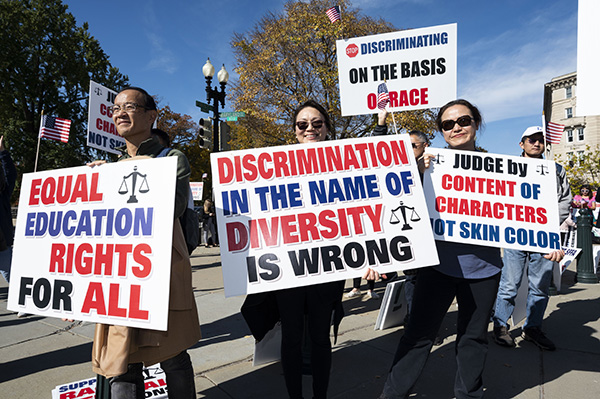The Supreme Court Ruling on Affirmative Action Is a Catastrophe
Steven Farron, American Renaissance, July 17, 2023
Subscribe to future audio versions of AmRen articles here.
The Supreme Court has decided in favor of the Students for Fair Admissions (SFFA) and has ruled that academic racial discrimination is unconstitutional.
In my book The Affirmative Action Hoax, I warned that such a decision would be catastrophic, since universities will respond by eliminating all objective criteria for admission. Now Edward Blum, who has orchestrated the fight against race-conscious university admission since 2012, says he favors admitting the top 10 percent or 20 percent of each high school graduating class, which is the way Texas and Florida reacted to the prospect of a ban on affirmative action. This procedure yields the same number of each ethnic group as explicit discrimination. It achieves that by doing away with standardized tests and ignoring the nature of the courses a student takes. It penalizes students for taking difficult courses and for attending high schools with rigorous requirements. It also promotes residential segregation by discouraging black and Hispanic families from moving out of black and Hispanic neighborhoods.[1]
I have repeatedly argued that we need explicit quotas. Colleges, graduate, and professional schools should announce how many of each group they will admit, use objective standards and set different cut-off grades for each group. That will ensure that at least their White and Asian students are qualified.

Rally against affirmative action in college admissions. (Credit Image: © Michael Brochstein/ZUMA Press Wire)
But a slim glimmer of hope remains. Chief Justice Roberts foresaw such shenanigans and wrote,
Universities may not simply establish through application essays or other means the regime we hold unlawful today. … [W]hat cannot be done directly cannot be done indirectly. The Constitution deals with substance, not shadows … [T]he prohibition against racial discrimination is levelled at the thing, not the name.
However, employment is more important than university admissions, and the SFFA’s Supreme Court decision may have a revolutionary effect on employment if it is applied. The Court ruled that the Fourteenth Amendment prohibits any government or governmental institution from taking race into consideration, and that no other consideration (in this case diversity) can override that prohibition. This decision should end considerations of race/ethnicity/gender in federal, state, and municipal governments’ employment (police, schools, etc.) and also the all-pervasive practice of “setting aside” government contracts for minority/women owned businesses.
The effect of the SFFA decision should also have a revolutionary effect on private businesses. The Court ruled that its interpretation of the Fourteenth Amendment applies not only to the University of North Carolina, a public university, but also to Harvard, a private university. Its reason was that Title VI of the 1964 Civil Rights Act prohibits racial or ethnic discrimination in any program or activity receiving federal financial aid. The most important section of the Civil Rights Act has always been Title VII, which prohibits discrimination in employment based on race, color, sex, and national origin. Since the passage of the Civil Rights Act, non-discrimination has been assumed to mean equal success by every organization involved in interpreting it (the Equal Employment Opportunity Commission, the Supreme Court, Congress, and every Presidential administration). However, now that the Supreme Court has applied its interpretation of the Fourteenth Amendment to the Civil Rights Act, that interpretation of Title VII should become illegal. In fact, the very existence of DEI offices in businesses should now be illegal.
* * *
[1] The Journal of Blacks in Higher Education (number 18, Summer 2000, pages 18-19), whose purpose is to increase the number of blacks in universities, observed, “Let us suppose we are going to give a prize for the worst idea of the past year … The prize might well go to the ‘X Percent’ plans for college admissions.”















